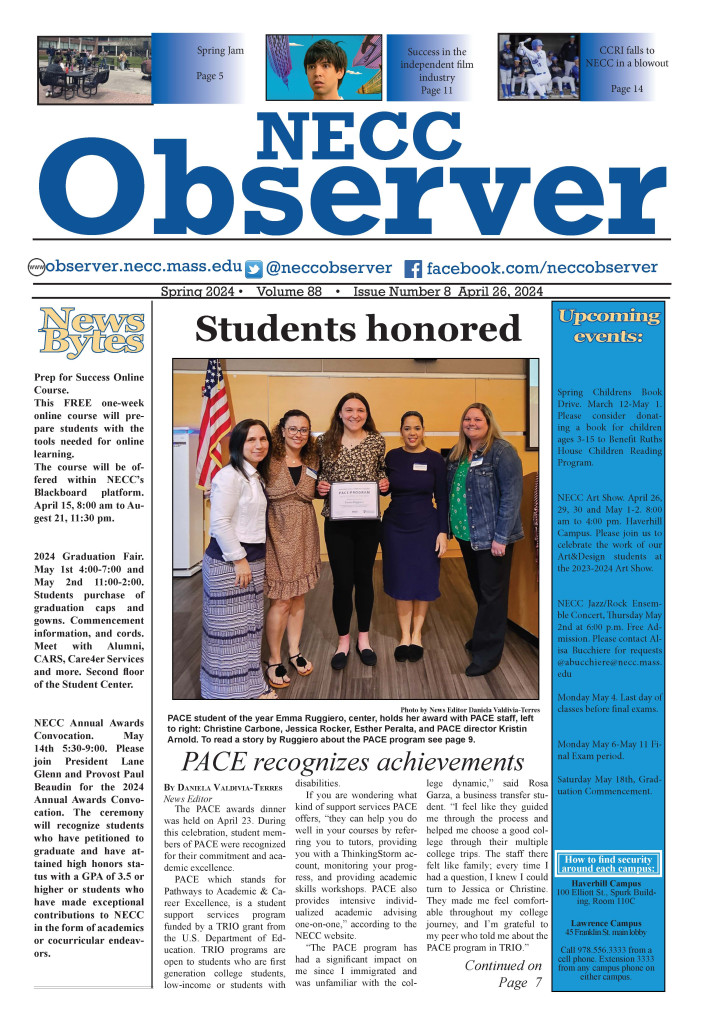Editor’s Note: The 15 community colleges in Massachusetts announced Sept. 20 that there will be a vaccine requirement for students, faculty and staff starting in January 2022. Students who are not vaccinated will be able to take online courses. Read the full announcement here: https://www.necc.mass.edu/current-students/wp-content/uploads/sites/5/home/COVID_Statement_from_Presidents-092021.pdf.
The Observer is interested in hearing your thoughts about this requirement. Get in touch with us at observer@necc.mass.edu.
NECC will hold a free vaccine clinic on the Haverhill and Lawrence campuses on Sept. 29 from 8 a.m. to noon. For more information, visit https://www.necc.mass.edu/newsroom/2021/09/23/necc-announces-pop-up-vaccination-clinics/.
The following is a story about students’ opinions on the college’s vaccine policies from the spring. The Observer plans to follow up soon with another article about the new requirement.
Just as the population of NECC’s students are diverse, so are their opinions about NECC’s decision not to require the COVID-19 vaccine to take in-person classes next semester. Some say they support the idea, while others say they would feel better knowing the people around them are vaccinated.
On April 29, NECC president Lane Glenn sent an email to inform students of the school’s decision. In the email, Glenn talked about how the college came to their decision.
He said, “[the students] who already face the greatest barriers to their education and to getting vaccinated, and who need us the most, were once again beginning to hear a message from expensive, selective, residential universities that did not apply to them, and we wanted them to know they would be welcome on our campuses.”
He also said that at the time of the email, all of the schools requiring vaccination have dormitories. NECC does not have students living on campus.
The college already requires that full time students be vaccinated for meningitis, the seasonal flu, measles, mumps, and rubella; and tetanus.
However, NECC is strongly encouraging students and employees to get the COVID-19 vaccine.
Zoey Lauria, a 20-year-old Science Biology alumni and STEM employee at NECC, said that while she assumes most people will be vaccinated by Fall, “I do wish it was a mandate like it is at other colleges.”
She said that while she acknowledges that vaccine access is disproportionately affecting impoverished and minority communities as Glenn stated, the fact that NECC has a vaccine clinic on campus means that “[mandating the vaccine] shouldn’t be leaving anyone out.” Lauria is fully vaccinated herself.
NECC worked with the Greater Lawrence Family Health Center to open a vaccine clinic on NECC’s Lawrence campus. It is located at the Dimitry building, 45 Franklin St. in Lawrence, and is open to the public.
Students can sign up for appointments by calling 978-686-6029.
Zachary Cutter, a 22-year-old Journalism major, said he thinks going to campus “will be safe to an extent if some of the precautions [are] followed.”
Cutter said he doesn’t think the vaccine should be required because so many people are voluntarily choosing to get vaccinated. Cutter himself is fully vaccinated.
Matheus Batista, a 19-year-old Exploratory Student at NECC, said he thinks allowing more people on campus without requiring vaccination is a bad idea until “we know most of the population is vaccinated.”
However, he said that if the ones at most risk are fully vaccinated, he “does not see the problem.”
Batista, who has already gotten his first dose, said he wouldn’t be going back to campus until he feels more certain that the vaccine is effective.


